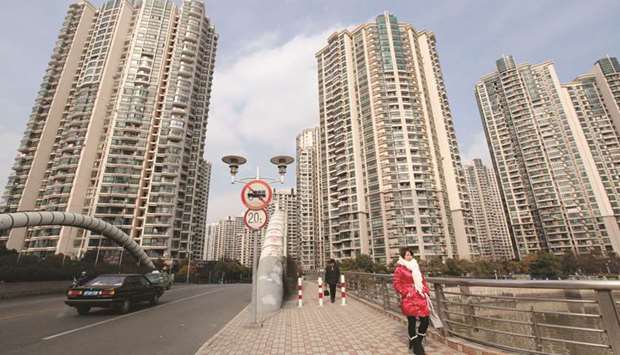Two growth-consumed developers, Sunac China Holdings and China Evergrande Group, have shown in recent months that piling on debt is no concern for stockholders.
Their shares have more than tripled in the past year, vastly outpacing the broader market. While bondholders have suffered, the equity market is betting that up-sizing will pay off as China’s urbanisation and property upgrading continue.
Sunac, which this week agreed to buy a portfolio of hotels, land and projects for 63.2bn yuan ($9.3bn) in China’s largest property deal, showcased the degree of unconcern. Despite warnings from ratings agencies and an unusual financing package behind the deal that features a loan from seller Dalian Wanda Group Co amounting to almost half the price, Sunac is up about 15% since the announcement.
In the debt market, Sunac’s position isn’t so rosy. The Tianjin-based company has seen its dollar notes maturing in 2019 drop almost 6 cents on the dollar in the past year, touching the lowest since February 2016 this week. Fitch Ratings cut Sunac deeper into junk territory after the deal, while S&P Global Ratings put its own sub-investment grade for the issuer on negative watch, and Moody’s Investors Service said the transaction raises financial risk.
“Both stock and bond investors reacted rationally – for equity investors, they care about growth potential, while for bond investors, they care more about Sunac’s ability to repay debt,” said Hong Hao, chief strategist at Bocom International Holdings Co. Even so, “it is worrying to see a Chinese company’s gearing ratio jump all of a sudden when credit growth is slowing down on the mainland and regulators are tightening in the financial markets.”
China’s policy makers have steadily tightened regulations on the property market over the past year or so to prevent a bubble, though new-home sales still climbed 13% in May from a year before, and prices of new apartments jumped more than 10% in Beijing, Shanghai and Guangzhou.
This isn’t the first cycle of lending, purchasing and development rules being tightened for property, however, and some predict that officials will ease up when economic growth slows, stoking the market all over again. Meantime, developers are in the middle of a shakeout, with smaller operators being swallowed up.
“In retrospect, buying land banks with an aggressive attitude in the past few years allowed some Chinese developers to emerge as consolidators,” Oscar Choi, an Asian property analyst at Citigroup in Hong Kong said in an interview earlier this year.
“This overturned the view held by some market watchers that high leverage is nothing but sinful.” Stockholders may still face a test.
Top Chinese financial regulators set to gather at a quinquennial meeting starting Friday to establish financial-policy priorities for the coming five years may re-emphasise the priority of reining in leverage – after debt soared to 258% of the economy’s size by 2016.
They have already stepped up scrutiny of some of the opaque areas of Chinese finance, such as wealth-management products and the funding behind the overseas acquisitions of several big conglomerates.
What’s benefited some developers, including one of the most aggressive – Country Garden Holdings Co – is the spread of momentum in the property market to China’s lower-tier cities, according to some analysts. And so far, the outlook has left them able to keep raising funding.

